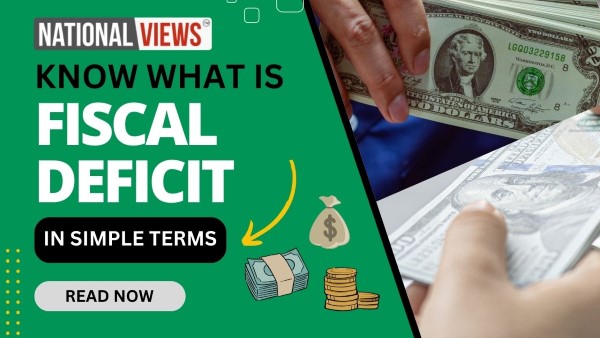Ever wondered why governments borrow money even when they seem to have plenty? Well, that’s where the concept of fiscal deficit comes in. Simply put, fiscal deficit is when a government’s expenditure exceeds its revenue, excluding the money it borrows. Think of it like running a household: if you spend more than you earn and make up the difference with loans, you’re essentially operating on a deficit.
Now, you might wonder, why would a government willingly run into debt? Isn’t that a bad thing? Not necessarily. Governments often use borrowed funds for infrastructure, healthcare, education, and other essential services that can spur economic growth. It’s a balancing act, really.
What is a Fiscal Deficit Explained: An Example
Let’s say the government plans to spend ₹10 lakh crore on various projects and programs in a year but earns only ₹7 lakh crore from taxes and other sources. The gap of ₹3 lakh crore is the fiscal deficit. To fill this gap, the government borrows money, typically by issuing bonds or taking loans.
But here’s where it gets tricky: just like borrowing for your dream house feels great initially but burdens you with EMI payments, the government’s borrowing adds up over time, leading to what we call a “debt burden.”
India’s Growing Fiscal Deficit: What’s Happening?
India’s fiscal deficit has been a hot topic lately. It’s no secret that our spending often outpaces our revenue. But why is that?
- Pandemic Fallout: The COVID-19 pandemic forced the government to spend big on healthcare, relief packages, and vaccinations. Revenue, meanwhile, took a hit due to slowed economic activity.
- Subsidies and Welfare Schemes: While schemes like free food distribution or farmer subsidies are critical for social welfare, they also add to government expenses.
- Rising Interest Payments: The loans India has taken in the past come with their own costs—interest payments, which eat into the government’s budget.
- Lower Tax Revenue: Tax evasion and inefficiencies in tax collection mean the government doesn’t always get what it’s owed.
For the fiscal year 2023-24, India’s fiscal deficit was estimated to be 5.9% of GDP. Sounds small? Not when you realize that translates to several lakh crores!
Also Read: Quickly Know How to Apply for Maharashtra Ladki Bahin Yojana 2024
Why Should You Care About Fiscal Deficit?
“Okay,” you might think, “this sounds like a government problem. How does it affect me?” Well, the fiscal deficit can sneak into your life in unexpected ways:
- Higher Taxes: To reduce the deficit, the government might raise taxes or introduce new ones.
- Inflation: Borrowing too much money can increase the money supply, leading to higher prices for everyday goods.
- Slower Growth: If a significant chunk of government revenue goes toward repaying loans, there’s less left for development projects.
Imagine planning a family vacation but realizing most of your salary is going toward EMIs. The same logic applies to governments!
A Psychological Twist: How Mindset Shapes Economic Choices
Here’s an interesting psychological angle: governments, like people, can fall into “loss aversion.” This means they fear the negative consequences of cutting spending (like upsetting voters) more than the long-term benefits of reducing debt.
Similarly, many individuals struggle to budget because spending on immediate needs feels more rewarding than saving for the future. Governments face this on a grander scale.
Ever noticed how election years often see a surge in government spending? That’s because the focus shifts to short-term wins rather than long-term stability. It’s like splurging on a fancy gift before a big family gathering to earn goodwill—even if your wallet protests!
Can Fiscal Deficit Be Good?
Here’s a curveball: not all fiscal deficits are bad. Surprised? It’s true. Economists often argue that borrowing for productive purposes, like building highways or investing in renewable energy, can stimulate growth.
For example, India’s spending on infrastructure like the Gati Shakti initiative is expected to create jobs, boost trade, and pay off in the long run. It’s like taking an education loan—if it leads to a higher-paying job, the debt was worth it.
However, if borrowed money is used for non-productive expenses (imagine taking a loan to buy luxury clothes), it can lead to trouble.
What Could India Do Differently?
If you were the finance minister, how would you tackle the fiscal deficit? Tough question, isn’t it? Here’s what experts suggest:
- Increase Tax Revenue: Improving tax compliance and plugging loopholes could bring in more money.
- Cut Wasteful Spending: Identifying areas of inefficiency and redirecting funds to productive sectors is key.
- Focus on Growth: Policies that boost GDP can help reduce the fiscal deficit as a percentage of the economy.
Also Read: Has the Move Toward a Green Economy Created an Energy Crisis?
Wrapping It Up: Why Fiscal Deficit Matters
So, is a fiscal deficit good or bad? Like most things in life, it’s all about balance. Borrowing isn’t inherently wrong, but using borrowed money wisely makes all the difference.
When you think about India’s fiscal deficit, it’s not just about numbers on a spreadsheet. It’s about the decisions that shape our economy, our lives, and our future.
Let me leave you with this: the next time you hear about the fiscal deficit on the news, don’t tune out. Instead, ask yourself, “How does this affect me, and what can I learn from it?” Who knows, it might just inspire you to take a closer look at your own financial habits.
What do you think about India’s approach to handling the fiscal deficit? Would you do anything differently? Let’s keep the conversation going!


